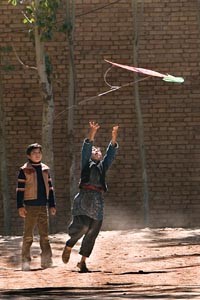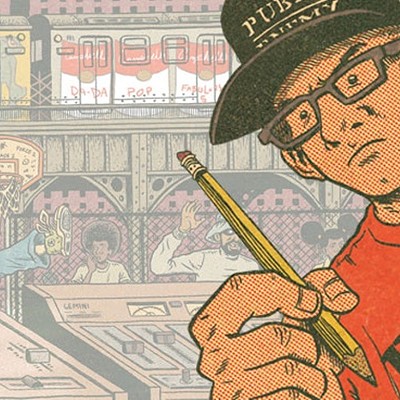One thing the cinema can do is take us to places we need to see but would never want to go. For about 15 minutes, near the end of its two hours, The Kite Runner, based on Khaled Hosseini’s best-selling novel, recreates Afghanistan in 2000, in the waning days (although they didn’t know it) of the Taliban dictatorship.
In a dilapidated stadium filled with men in beards and turbans, a charismatic leader introduces the day’s entertainment: a woman who, for some unnamed crime against God, must meet her punishment, and possibly her Maker, for the sport of a holy audience.
The first stone hits her in the head, knocks her to the ground. More stones follow, and soon blood begins to soak through her burka. It’s a shocking spectacle, mercilessly realized, and another reminder that politics mixed with religious extremism is the oldest story in the book (whichever Book you happen to worship).
Among the crowd at the stoning that afternoon is Amir (Khalid Abdalla), who at this point in his life has lived in the United States for 20 years, having emigrated as a child with his father in 1979, when the Russians invaded his country. He’s a husband and novelist, but not a father himself, and that’s why he’s come home.
The Kite Runner tells its story in three movements and three eras: In Kabul, circa 1978-79, where Amir (played as a child by Zekeria Ebrahimi) grew up in affluence with his educated professional father (Homayon Ershadi); in California, 10 years later, where his father works in a gas station and sells junk at an outdoor bazaar; and finally, back in Afghanistan, where Amir, a newly published novelist, goes on an odyssey to make up for the sins of his childhood.
The lessons in The Kite Runner — historical, cultural, ethical, moral — are many, and director Marc Foster (Monster’s Ball) presents them simply and cleanly, underscoring the things we need to know just enough for everyone to get them. Equal credit for this effect certainly goes to Hosseini, and to screenwriter David Benioff, who’s also a novelist (25th Hour) in his spare time, although making the Afghan bad guy a neo-Nazi child molester does go just a bit overboard.
But too often The Kite Runner feels like a clickable drama: “Taliban,” “Sharia,” “Afghanistan, Soviet Invasion Of” — these are some of the links you’ll find as its fabricated story revisits recent history. A work like this gives human dimension to the brown faces and suspicious accents we racially profile now in our newly dangerous world. It just never transcends two dimensions, and virtually every word of dialogue comes from the catalogue of noble sayings reserved for the Dignified Other.
The Kite Runner is an interlocking series of metaphors, some of them exceptionally cruel. How much can a self-righteous father expect of a child? How much can a frightened child expect of himself? Does Fate punish Evil?
In the drama’s first movement, in Kabul, Amir is a talented kite flier, as was his father. His pal Hassan, the son of his father’s manservant, is even better at it. Hassan is younger and smaller than Amir, yet he’s the one who stands up to the three older boys who bully them. He’s so brave that when the bullies try to steal the kite he’d promised to Amir, he refuses to hand it over — and the leader of the pack rapes him (then doesn’t steal the kite, a thoroughly baffling plot point).
The clincher is that Amir, in hiding, witnesses the beating and rape, and he does nothing, despite his father’s constant admonitions of high-minded morality. Years later, Amir returns to rescue Hassan’s son from an orphanage, thus redeeming himself for his childhood cowardice, although the way it plays out, after the stoning scene, is the sort of amateurish storytelling you read in an undergraduate fiction-writing class.
Fortunately, The Kite Runner has enough else to justify its existence. Although China fills in as a location for Afghanistan, the movie’s sets more than adequately reconstruct bombed-about post-war Kabul and the privileged lives of cultural elites before the Soviet invasion. Its point of view is simple, stopping just short of being simplistic, and it’s something for Americans to cheer: “The mullahs want to rule our souls,” Amir’s father says, “and the Communists tell us we don’t have any.” Who can argue with that?
There’s much story to tell here — what about the rest of the country as Amir and his father so enjoyed their wealth? — and that’s where the clickable links come in. As a primer, though, The Kite Runner is a reasonable place to start. In Pashto, Urdu, Russian and English, with subtitles.















